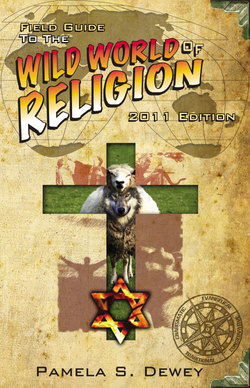Читать книгу Field Guide to the Wild World of Religion: 2011 Edition - Pamela J.D. Dewey - Страница 34
На сайте Литреса книга снята с продажи.
ОглавлениеChapter 7
Prescription for Intervention
Suggestions for dealing with friends or family members who are, or are on their way to becoming, affiliated with what you believe to be a potentially harmful religious group
Those who have family or friends involved with groups which have some of the characteristics described in the previous chapter are often very concerned about their loved one’s welfare. Such involvement usually puts a great strain on the relationship, as the new convert becomes more and more involved in the activities of the group and pulls further and further away from fellowship with any “unbelievers,” including family and former close friends. The temptation is great to try to pry them loose. But please note the following observations before attempting such a project.
1.Arguing doctrine with a dedicated convert is usually a losing battle. By the time they are seriously committed to their newfound leader or group, they usually have pat answers for almost any biblical issue you can bring up. In addition, the organization’s “reasoning” methods may be so convoluted that normal logic doesn’t apply.
2.One of the doctrines that many such unhealthy groups inculcate very early in any convert is absolute, unquestioning loyalty to the organizational leadership, unquestioning agreement with its teachings, and unquestioning obedience to its policies. This makes it even more difficult to discuss any biblical matter. The new convert will defer to the leadership whenever they are confused about a Bible passage.
3.Many, many members of a wide variety of potentially harmful groups, including even such large groups as the Jehovah’s Witnesses, have left—or been kicked out of—such groups in recent decades. In most cases, these people did not start down the path to exiting the group because of doctrinal questions, but rather because they began to have doubts about some of the horrible fruit of some of the policies of the group.
4.A few years ago, it was very difficult for a doubting group member to get any support from others, as there is often a system of spying within such organizations. Any doubts expressed, even to a close personal friend in the congregation, would usually be reported to the local leadership, and could result in suspension or expulsion. Because the dedicated convert believes that the organization has the only path to salvation, the idea of disfellowshipment can be terrifying. Thus, even if they were beginning to have serious doubts about some matters, most members put them out of their minds, out of fear of retribution. With the advent of the Internet, this situation has changed somewhat. There are, around the world, a wide variety of groups of former members of such potentially unhealthy religious groups specifically dedicated to helping people get free from their former organizations. They have websites and anonymous discussion forums, where “doubters” can go to get accurate information and help in sorting through their questions.
5.It is helpful for family and friends to know at least a bit about the history, doctrines, and policies of the group with which their loved one is involved. This way they can know what they are up against if they wish to intervene in any way with their loved one’s choice to be involved with the group. The only effective, practical method I have seen for having any chance of affecting the dedication of someone involved in such organizations is to very gently nurture any areas of even slight doubt that the convert may express. This must be done not by addressing them head-on, but by carefully and casually encouraging the person to talk about them.
6.Keeping the lines of communication open with a friend or relative who has begun studying with a troubling group or who has joined the group is difficult. The policies of many such groups encourage estrangement from family and non-group friends, and immersing oneself in an endless round of meetings and Bible studies, and perhaps even door-to-door or street witnessing. The really dedicated convert can spend almost all free time involved in these activities. Therefore it is vital to see that every opportunity for interaction with the convert is as positive, supportive, and loving as possible. Mocking their beliefs, arguing about doctrine, or complaining about the fact that they have little time for friends and family any more, will only lead them to conclude that they are being “persecuted for righteousness’ sake.”
7.Love is, in the end, the only answer for this situation. Love the person unconditionally. Express that love openly. Don’t be drawn into hostile discussions that go nowhere, and that only end up convincing them, in their own mind, that you don’t love God—and you don’t love them.
Useful documentation
Use the books and weblinks listed in this book, including those in the Web Resources and Books chapter, and add your own efforts to search for more information about the group or leader about which you have concerns. An easy way to do this on the Web is to make use of one of the large Internet websearch engines. My favorite is:
www.google.com
If you find useful information on the Web, collect it and print it out—but not to give to your loved one right away. Keep it on hand for future use, if they begin to evidence doubts about their involvement. Even then, don’t bury them in an avalanche of material, but dole it out in bits and pieces related to the specific questions they may begin to develop. If they become seriously disillusioned at some point, only then might it be helpful to offer them your complete collection of information.
And be sure to check the Field Guide to the Wild World of Religion companion website:
www.isitso.org/guide.
It has much more extensive information, documentation, and commentary on a number of troubling religious groups than could be included in this brief book.
